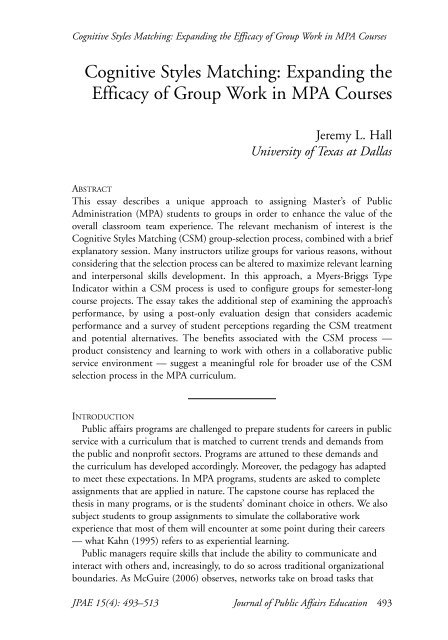JOURNAL OF PUBLIC AFFAIRS EDUCATION - National ...
JOURNAL OF PUBLIC AFFAIRS EDUCATION - National ...
JOURNAL OF PUBLIC AFFAIRS EDUCATION - National ...
You also want an ePaper? Increase the reach of your titles
YUMPU automatically turns print PDFs into web optimized ePapers that Google loves.
Cognitive Styles Matching: Expanding the Efficacy of Group Work in MPA Courses<br />
Cognitive Styles Matching: Expanding the<br />
Efficacy of Group Work in MPA Courses<br />
Jeremy L. Hall<br />
University of Texas at Dallas<br />
ABSTRACT<br />
This essay describes a unique approach to assigning Master’s of Public<br />
Administration (MPA) students to groups in order to enhance the value of the<br />
overall classroom team experience. The relevant mechanism of interest is the<br />
Cognitive Styles Matching (CSM) group-selection process, combined with a brief<br />
explanatory session. Many instructors utilize groups for various reasons, without<br />
considering that the selection process can be altered to maximize relevant learning<br />
and interpersonal skills development. In this approach, a Myers-Briggs Type<br />
Indicator within a CSM process is used to configure groups for semester-long<br />
course projects. The essay takes the additional step of examining the approach’s<br />
performance, by using a post-only evaluation design that considers academic<br />
performance and a survey of student perceptions regarding the CSM treatment<br />
and potential alternatives. The benefits associated with the CSM process —<br />
product consistency and learning to work with others in a collaborative public<br />
service environment — suggest a meaningful role for broader use of the CSM<br />
selection process in the MPA curriculum.<br />
INTRODUCTION<br />
Public affairs programs are challenged to prepare students for careers in public<br />
service with a curriculum that is matched to current trends and demands from<br />
the public and nonprofit sectors. Programs are attuned to these demands and<br />
the curriculum has developed accordingly. Moreover, the pedagogy has adapted<br />
to meet these expectations. In MPA programs, students are asked to complete<br />
assignments that are applied in nature. The capstone course has replaced the<br />
thesis in many programs, or is the students’ dominant choice in others. We also<br />
subject students to group assignments to simulate the collaborative work<br />
experience that most of them will encounter at some point during their careers<br />
— what Kahn (1995) refers to as experiential learning.<br />
Public managers require skills that include the ability to communicate and<br />
interact with others and, increasingly, to do so across traditional organizational<br />
boundaries. As McGuire (2006) observes, networks take on broad tasks that<br />
JPAE 15(4): 493–513 Journal of Public Affairs Education 493

















